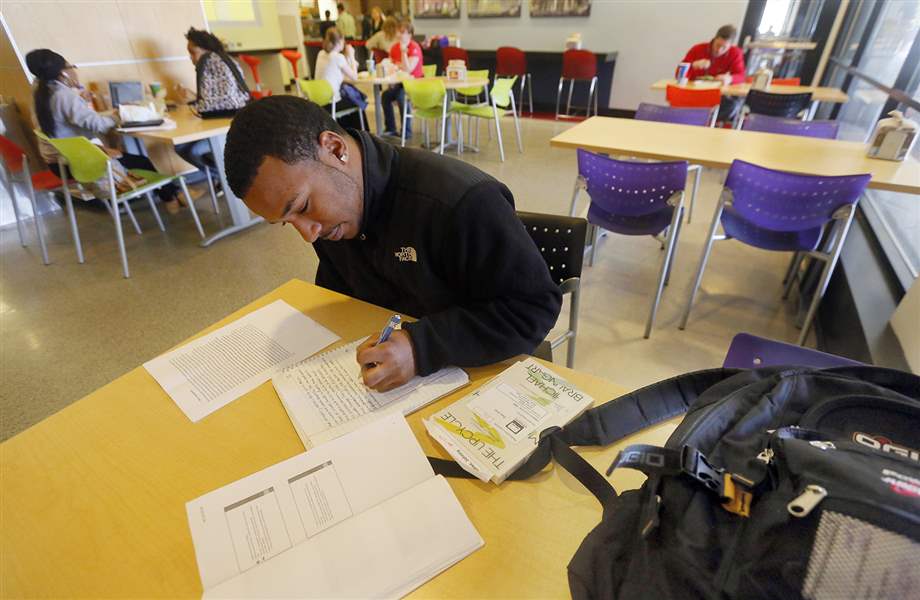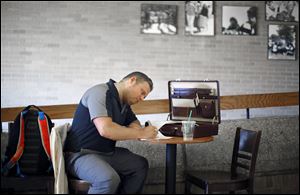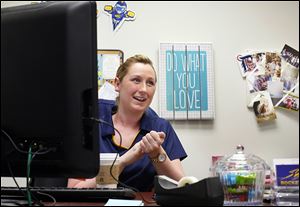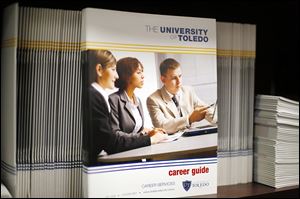
Signs indicate new grads see easier entry into job market
Local universities say more recruiters visiting campus
5/4/2014
Johnny Reese, a senior at the University of Toledo, studies at the cafeteria in the student union on campus. Mr. Reese says he feels optimistic about the hunt for a job. And while there are reasons for optimism, experts caution that job-hunting is still tough.
THE BLADE/AMY E. VOIGT
Buy This Image

Johnny Reese, a senior at the University of Toledo, studies at the cafeteria in the student union on campus. Mr. Reese says he feels optimistic about the hunt for a job. And while there are reasons for optimism, experts caution that job-hunting is still tough.
Newly minted college graduates are expected to have better job opportunities in 2014 than their recent predecessors inherited upon graduation, but the U.S. job market remains crowded, making it challenging for young workers to kick off their careers.
“It’s still very competitive for new graduates,” said Andrea Koncz, employment information manager at the National Association of Colleges and Employers. “We’re hearing that employers are on campus hiring new grads, but it’s still very competitive.”
The organization’s annual report on the job outlook for graduates — viewed by many in academia as a benchmark survey — does show improvement. The association found employers plan to hire 8.6 percent more graduates from the class of 2014 than they did last year from the class of 2013.
The report was just one of a trio of recent surveys that new graduates should find encouraging.
CareerBuilder.com quizzed more than 2,100 hiring managers and found 57 percent of firms say they’ll look to hire new graduates this year, up from 53 percent in 2013. Meanwhile, Chicago outplacement firm Challenger Gray & Christmas Inc. said 64 percent of employers it surveyed plan to recruit from the class of 2014 in its first-ever look into the topic.
Locally, university career development officials also say they’re seeing more recruiters coming to their campuses and much better turnouts at job fairs.
“It’s been a rebound,” said Jeff Jackson, career center director at Bowling Green State University. “Employers have stated they are expecting to hire more students and that parallels what’s been happening here.”
Mr. Jackson said BGSU’s most recent job fair drew more than 180 employers, considerably more than the school attracted in 2012 and 2013. Officials at the University of Toledo also say they’re experiencing an increase in interest from employers.

Josh Howarth, University of Toledo senior, studies in the coffee shop in the student union. Economists at the Federal Reserve Bank of New York say that unemployment and underemployment of recent graduates are higher than historical norms.
And many who are soon to graduate feel good about their chances. Johnny Reese, a Toledoan who is completing a bachelor’s degree in applied organization technology at the University of Toledo, said he’s optimistic.
“I think the job market is fair right now. There are jobs out there. We just have to know where to search for them and what resources to allocate in order to take advantage of them,” he said.
But while reasons for optimism exist, experts caution that many graduates are still in for a tough search.
Though the U.S. unemployment rate has dropped below 7 percent, it remains higher than historical averages. Salary growth remains slow. Economic expansion continues to be tepid.
“The bottom line is, it’s not a good labor market to be graduating into,” said Martha Ross, a fellow at the Brookings Institution who recently co-wrote a paper looking at the labor market for those aged 16 to 24 during the last decade.
However, Ms. Ross and others say one of the biggest hurdles recent graduates face isn’t necessarily a lack of job openings — it’s a lack of experience.
“We’ve had a weak job recovery and newly minted college grads are competing against more experienced workers who in this job market would be happy to take a job they might not otherwise have looked at,” Ms. Ross said.
Indeed, based on the CareerBuilder survey, the top complaint about college graduates is that they’ve had too much emphasis on book learning instead of real-world learning.
Erin Harper, a graduate assistant at the University of Toledo’s Center for Experiential Learning and Career Development, said that’s something that comes up often when she meets with students.
“I think they’re finding positions that are open, but they are having a hard time because they don’t have the experience and qualifications they need to get to the interview,” she said.
The most successful students, she said, tend to be those who have gotten involved in their fields early and continued that involvement.
Andrea Domachowski, chief of career services at Lourdes University in Sylvania, said students seem to recognize that. While the majority of soon-to-be graduates she speaks with are optimistic about their job searches, those with experience on their resume tend to feel the most confident.
“Those that have practical experience under their belts are feeling a little bit more reassured. An internship, a clinical, some sort of a field experience. Employers really want to see those experiences now,” she said.
Still tough out there

Erin Harper of UT’s Center for Experiential Learning and Career Development, says students often report difficulty in landing an interview because they lack experience and qualifications.
Still, some graduates find the search can be more difficult than they expected, even when they’ve had internships.
Lindsey Hanely, a Graytown, Ohio, native who is set to soon receive a master in business administration from Lourdes University, hoped to land a health-care industry job in Florida after graduation. She’s had internships but is finding herself stuck.
“It’s not going as well as I anticipated,” she said. “A lot of places are saying I’m overqualified due to the master’s, and I have other places saying I don’t have enough experience, the reason being that I stayed in school to get my master’s.”
Ms. Hanely, who did her undergraduate work at Bowling Green State University, has widened her search nationwide. She’s sent out some 30 resumes in the last week alone.
“I've been applying like crazy,” she said, adding that she’s reworked her resume and even added a photo to try to generate a more personal connection to recruiters.
Though Ms. Hanely admits to being a bit concerned, she said she has no regrets about staying in college to chase a master’s degree.
Beyond Monster
Career advisers say the current job market demands that graduates be aggressive and assertive with their job search.
“You need to go way past Monster,” Ms. Harper said.
Those online job boards can be a good start, but “you can’t just sit behind a computer screen and apply to 500 different places and expect to get a job,” she said. “It doesn't work that way. You need to network, you need to get out there, you need to gain experience in your field.”
Experts also say structural concerns over college graduates being unable to find good jobs right out of school may be slightly overblown. It’s true that many are underemployed — at jobs for which they are overqualified — and that unemployment rates among recent college graduates are higher than the overall U.S. rate. However, recent work by a group of economists from the Federal Reserve Bank of New York found that isn’t unique to today.

Career advisers urge students to utilize all available options — not just online job sites — to land a job after graduation.
The U.S. Bureau of Labor Statistics said unemployment among those aged 20 to 24 who have earned a bachelor’s degree averaged 8 percent last year, slightly higher than the overall average of 7.4 percent and much higher than the 4 percent unemployment reported for bachelor recipients of all ages.
While the paper from the New York Fed economists did confirm that unemployment and underemployment of recent graduates are higher than historical norms, it is not an unusual phenomenon or one that can be directly pinned on the Great Recession.
Degree helps a lot
“Our analysis demonstrates that new college graduates typically take some time to transition into the labor market and find jobs that utilize their education,” the paper concluded. “In fact, during both good and bad economic times, relatively high rates of unemployment and underemployment are not uncommon among college graduates just beginning their careers, and those rates can be expected to drop considerably by the time the graduates reach their late 20s.”
It’s also important to note that the overall unemployment rate of those age 20 to 24 was nearly 13 percent last year.
“It’s kind of cold comfort to a college graduate who’s having trouble looking for a job, but the fact is they’re much better positioned than peers of their age who do not have a four-year degree," Ms. Ross said.
Though economic growth been slow in the early months of 2014, there may be signs that the economy could be gaining momentum.
Payroll processor ADP — Automatic Data Processing Inc. — said Wednesday that private-sector employment rose by 220,000 jobs in April — the most in five months and well above the 12-month average. For the year, ADP says employers have added some 743,000 jobs.
Contact Tyrel Linkhorn at tlinkhorn@theblade.com or 419-724-6134 or on Twitter @BladeAutoWriter.